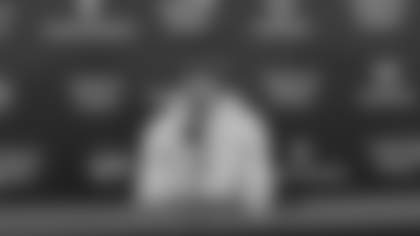On the amount of work that goes into the NFL Draft:
"Well, first let me just say this, I want to thank the job that our area scouts did. They just did a fantastic job this year compiling all the information and doing all the research and all the evaluations. And I mean, this is a very long process. The irony of it is we're gonna restart this process already at the end of May. So, we'll be working on next year's class just like that. This is a process that works through the fall schedule, and then we jump into All Star games and from there get into spring workouts. And we have a series of meetings that take place throughout the year and into December. So yes, it's a long, dragged out process to finally get to these end results and over these last three days, this is the reward for the scouts and for the organization as a whole. So, we're really excited about where we are coming out of everything."
*On if focusing on the secondary with the first two picks was the plan heading into the draft: *"Well, certainly there was a level where there was some priority in addressing the secondary, but at the same time the board will speak to you as you go through this process and over the day. So as it really kind of played out for us, the board was speaking to us that there was depth at the secondary position and that there was kind of a variety of skillsets there that could definitely fit what we wanna do defensively. So, that really kind of organically happened in that sense. But we're super excited about the two players that we added in [CB Emmanuel] Forbes and that we also added in [DB] Jartavius [Martin]. So yeah, we're thrilled to death and excited to work with those young men."
On if the new offensive system changed their evaluation of any of the offensive linemen:
"No, it did not. Really, in terms of what EB [offensive coordinator Eric Bieniemy] wants to do, it's gonna be pretty much very similar to what we already had in place. I would say that maybe some things are gonna tweak a little bit with the passing game that you'll maybe get a little sense of once we get going into these OTA systems and we get into camp and whatnot, that may be some subtle tweaks. But all in all, for offensive lineman you can never go wrong with big, smart, tough, physical guys, competitive nature. So, a lot of those same traits will just carry right over."
On what he saw from T Braeden Daniels:
"Well, I think you're gonna hear this a lot and I hate to have some redundancy to it, but positional flexibility is always gonna be key along the offensive line. So, as it pertains to Daniels, the fact that he's been a left tackle, and we feel like that he also has the flexibility of moving to guard that's just an added bonus in terms of what we're trying to do in terms of establishing depth along the offensive line and really rebuilding that front and getting some youth back into that offensive line even more importantly. So, that's what really has us excited about him."
On what are some of the key traits he looks for in prospects:
"For me, I keep it very simple. We want big, smart, fast, tough guys, reliable players, guys that love the game. So, I really try not to complicate it in terms of my own personal profile. And generally speaking, those are the guys that I'm gonna gravitate towards and that I think are going to be best in terms of what we're looking for to add for this organization and fit for the Commanders."
On what the undrafted free agency market is like right now:
"It is a rat race. It's still ongoing. I just left that room, so forgive me if I'm a little hoarse and exhausted, but we've had a lot of conversation going on in there on the phones. It's going well, and we hope to get that all wrapped up here later this evening."
On if he wants to break any news about those signings:
"Well, I like 'em all. [Laugh]. No. No news to break on that."
On players being immediate contributors and if that was an emphasis:
"No, I wouldn't say that at all. I would just say in terms of, again, we're just kind of operating on the flow of how the board operated. I think we just kind of fell into some guys that really just kind of fit that profile and had experience. I would not say that it matters kind of one way or the other. We really go back to our formula, fit the skill sets and then we just mesh what we're trying to do in terms of both offensively and defensively with those particular profiles. That's really how this all kind of came together. That's how this class is kind of rounded out."
On big roster moves after the draft:
"Well, you're always planning for it. I mean, look, you're always gonna have an aggressive approach to what we're doing when it comes to personnel. So, you know, we've had been fortunate to make some moves and you know, get a Bobby McCain or land Ereck Flowers very late in the process right when you think things are starting to slow down. So, we'll continue to try to build upon the roster in any shape, form, or fashion as we go forward here. So I would never say that that we're done in terms of personnel. We're always gonna search, and if there's areas where we can upgrade this roster, we're certainly gonna explore it."
On balancing things when it comes to Forbes and his size and production:
"Well, you know he's a guy that's played three years in SEC really at the highest level. He's been a terrific player in his own right in that conference. He's seen 'em all, we know the type of receivers that have come out of that conference. And he's always seen all the high level guys. So there was a lot of confidence in terms of just that because again, we've had an ideal of him seeing against top level SEC receivers, guys that are already in our league. He'll have a lot of familiarity right away. So that really kind of softens a lot of the concerns that you may have in terms of whether it's weight or size. I mean, he's done it and he's been a very productive player."
On if there is a general sense of how many guys they'll get reports on:
"Personally, I'm typically around 250 plus reports in my particular role. I would say that, an area scout, those role and I've been there might tip closer to over 500 players in terms of the volume of reports that they've written. It is a very extensive process. Again, it's not so much about the guys that you wrote, but the ones that you sign, right. So those are the ones that really matter at the end of the day."
On what motivates him day to day:
"I'm competitive. Just competitive nature. Look, you always want to do it at the highest, try to do things at the highest level and take a lot of pride. And all of our scouts do, I mean, all of our guys take tremendous pride in what they're doing. If you could just see the body of work that you guys unfortunately don't get to see, but again, they do a fantastic job in terms of their attention to detail. Obviously, I feel like area scouts in some ways are the lifeblood of the organization because typically you're building to the draft in that sense."
*On if there was one part of the process that helped the team the most: *"Well, I always think at the end of the year once we are able to start interviewing players, because I've really learned a lot from that covid year of just how difficult the Zoom was and that disconnect and not really being able to have a sense of really feeling the players and feeling that interaction, the communication. So, I am so excited that we are past that world and once we get those all-star games and we can actually sit down and start interviewing guys and have an opportunity to talk to them and then work through that process of as we get to the combine. Obviously with our 30 visits, and as you can see, most of these guys that we drafted did come in on our 30 visits. You can never have enough one-on-one face-to-face exposure, whether if that's with our personnel, whether that's with our coaching staff. That's something that you have to cherish it and you can gain so much from it."
On if there was one player's tape that he watched over and over again:
"I would probably say [Emmanuel]Forbes to a certain degree because the play that he made against Kentucky when he intercepted the screen was probably one of the more fantastic plays that I've seen in a number of years. When I saw that, I was like, wow and that just had me just getting him more and more and more. We know about the size. It's been well documented but I think anytime too, when you kind of come across someone with those dimensions, you do have to put them under a little bit different level of scrutiny. In terms of my process, I mean, I grinded Forbes. I wanted to see it. I went through basically three years of tape watching him over and over and over, but the reality is he answered the bell every time with play after play after play. Look, his production speaks for itself throughout his career and that's well documented as well."
On his involvement in the 30 visits:
"I help play a role in coordinating how we structure our 30 visits and the main thing that I really try to stress in terms of as the players come in is that they have an opportunity to touch everyone in the building. I think that that's really important, whether if that's our interns picking them up, if that's spending time with some of our scouting admins. We know they're gonna spend time with all of our coaches in various position groups but it's also important that they spend time with pretty much so all of our scouts are in the building and that everybody has an opportunity to have some interaction with the player. When the players come in, I also tell them, you know, not only are we interviewing them, but in some ways they're interviewing us, so I think it's always important. I always tell the guys that when they come in, please ask any questions. You should never leave here on a 30 visit and not have questions unanswered. So, at some point when you come across somebody, if there's something that you don't know, please feel free to ask the questions that you don't know so that in case these things happen, everyone now has an understanding of really what our culture's about, how things operate, what our coaches are like, all those things. I think that's really important in terms of then also getting them onboarded later on if we do have the opportunity to draft them. There's already familiarity. The second Forbes walked in, I had an opportunity to see him walking in, lit up, big smile, why I spent a lot of time with them. We had dialogue. We already had a little bit of a rapport. I would say that would be a consensus throughout the building in terms of him being in, so yeah, it's an important process."
On his relationship with Director of College Personnel Tim Gribble and how many hours during this process he spends with him:
"Yeah, you know what, we have quite a bit of dialogue. I did not know Tim initially when I came here. Ironically really hadn't seen much of him on the road and sometimes that's the way it is or it's the way our paths had crossed from a career standpoint, but a tremendous amount of respect for, Tim does a fantastic job managing our college scout department. I think initially was interesting because he knew my career path has basically been on the college front. I've been a college director twice at two different organizations but I thought it was really important for me when I had a chance to sit down with Tim when I came into the new role. I wanted him to take ownership of it initially. It was kind of interesting because I think he was waiting for me, but I stressed it's important, Tim, you're gonna take ownership of this, put your own spins on it, put your own ideals on it, there may be some things that come to light that maybe I wasn't even aware of but my process. I was very open-minded to just his thoughts and ideals and I really wanted him to run with it. I think he's done a fantastic job."
On what he's looking for to separate DB's from each other:
"Well, when it comes to the secondary play, and when it comes to really our style of defense and our system, you know obviously instincts drive all players. But I think the one thing that's important in our particular system is just discipline eyes, guys that can see through the triangle, guys that can have a feel for route combinations unfolding. Guys that can anticipate, where the quarterback's eyes are going, that can anticipate different drops and steps. Even to some of the nuanced details of reading offensive line. Are they heavy on their hands? Are they light? There's a lot of different aspects to that but certainly those are just some of the traits that you're looking for when you're looking at defensive back play."
On how he measures instincts of DB's:
"At the end of the day, you get a sense of how that kind of goes game to game. That's why you put so many games on. You can't look at anything in the vacuum. You understand that, look, that's the position that times where guys are going to get beat and that's just the reality. As you really look at it, its how did they get beat? What caused them to put themselves in a bad position. And then as you kind of go through it, were they able to self-correct? It only becomes a problem when you see guys that can't self-correct. The guys that get beat every once in a while, but can atone for their mistakes, so to speak, It doesn't really bother me because you want guys to be aggressive. Usually big time playmakers will have some moments where they get beat, but that's also what makes 'em special in terms of being able to create turnovers and make plays on the ball, and it's all those same things. So, that's really kind of what I look for."
On how unusual it was to go that far back on analyzing CB Emmanuel Forbes:
"Not unusual at all. Usually on any of our draftable prospects, I'm literally putting about two seasons worth of tape on them. So for me, that would not be unusual, but I did go back on three on this one, but again, I just wanted to see what did that, it wasn't so much about, to be very clear even about the size, but what did that process look like in terms of his development? So it was really cool as you really go to that, you kind of saw that in his early years as a sophomore, kind of a young guy that was just kind of hanging on and relying on his ability. But then as you see him get to the point that he is now, you really see a guy that is locked in on the nuances of the game. And like I said, anyone that's seen that interception on the Kentucky game will tell you that that is a rare special play. You can watch game after game after game and not see something like that. So, that really told me this guy has next level type anticipation, feel, and instincts."










